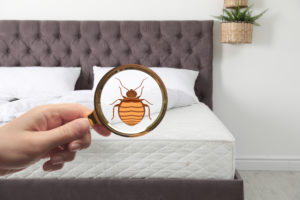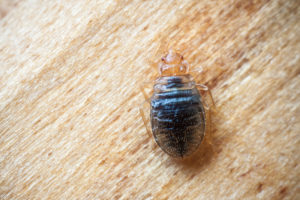You don’t have to be freaked out by creepy crawlies and dread infestations; however, battling bugs and insects in the home can take away some sense of security. Sure, a pest isn’t going to mug you or anything, but the home should be a place you can relax in relatively bug-free peace.
Bed bugs are especially insidious. They strike when and where you’re most defenseless — laying in bed. Sleeping or while sitting on the couch watching a movie. The psychological toll is immense.
Read on to find out what you should know about bed bug prevention, and the best ways to get rid of bed bugs if you find some hanging around.
How to Recognize Bed Bugs

You might have trouble with how to prevent bed bugs if you don’t know what you’re dealing with.
By Behavior
Let us begin by debunking a common but pervasive myth: Bed bugs are not caused by, nor attracted to, filth or messiness.
It may be more difficult to find (and eradicate) them in a dirty, messy environment, but they are just as likely to be hiding in a clean home. Hiding in plain sight is their whole modus operandi.
-
-
- So how do you get bed bugs in the first place?
-
The only thing that causes bed bugs are picking them up like secret hitchhikers and unwittingly depositing them to a new location, or they themselves infiltrating your space from nearby. They can use crevices in walls and flooring to move adjacently. Unlike other parasitic pests, you don’t need to worry about picking them up in the untamed wilderness.
-
-
- How do bed bugs travel? Do bed bugs jump or fly?
-
No, they can’t do anything except crawl everywhere, albeit at a brisk pace. Putting your bags down in bed bug territory means they could come home with you. You can briefly investigate hotel beds, carpeting along baseboards, and high traffic upholstered areas, like cloth seats or common furniture for bed bug stains to check for them.
By Visual Cues
Bed bug stains, you may ask? It’s one of a few telltale signs that may indicate bed bugs:
-
-
- Waking up with bites or allergic reactions on exposed skin — although bed bug bites are painless at the time and may not cause a later reaction at all. Check for other types of pests in the absence of further evidence.
- Small, spotty blood stains on sheets.
- Bedding has little dark stains that sort of run downwards — this is, unfortunately, bed bug poop. (But really, bed bug droppings are just a different type of bloodstain, considering their diet.)
- The mother of all indications — you locate a bed bug itself, and maybe a dozen of its friends, at the local hang out known as your box spring.
-
Bed bugs are very small but visible to the naked eye, especially when congregating in groups. (They are larger than fleas if you’re familiar with the little pet parasite.) Their appearance is oval-shaped, somewhat flat, and reddish-brown. What seems to be black bed bugs could be recently-fed nymphs — not yet adults.
Investigate for the staining and any cast-off skins in that case. Eggs, newly hatched nymphs, and molted skins are smaller as well as lighter in color.
Other Facts to Know About Bed Bugs
-
- How long can bed bugs live?
On average, 2 to 6 months, but longer in colder temperatures with a slowed metabolism. “How long do bed bugs live” is often cited as up to a year, for a worst-case scenario, but that’d be extreme in most cases.
-
- What do bed bugs feed on?
Bed bugs exclusively feed on blood, preferring humans to animals if they have options. They are parasites like fleas and ticks, but never live on or burrow into their targets and transmit no diseases.
-
- How often do bed bugs feed?
Once or twice a week, every 3 to 7 days. They need to feed in order to grow into adults and to reproduce. But bumps or a rash could take longer than that to manifest if they were going to at all, so tracking their feeding schedule won’t serve you well.
-
- How long can bed bugs live without food? Can you just starve out an infestation?
Unfortunately, you can’t! Bed bugs can go at least 2 months or so without drinking blood. But even in your absence, they may pick on rodents, pets, or move house to a neighbor, in which case they could still come back afterward.
-
- How to find bed bugs during the day if they’re active at night?
They will often hide nearby, in your mattress or headboard or frame or box spring, waiting for your return. They also like perimeters, soft material, and other furniture. So you just have to carefully look around for them, and if you never, ever find any, it probably means they aren’t there. They don’t dematerialize when daylight breaks.
But if you work nights and sleep when the sun’s out, do the bugs sleep through it since they’re nocturnal? Just as you have adapted, they would as well, forced into feeding on your schedule. So don’t think of day and night as hard guidelines for bed bug activity.
-
- What kills bed bugs?
They’re sort of hardy little things but hardly indestructible. They can be vacuumed up and promptly discarded, no problem. Heat over 120 degrees Fahrenheit, such as from the dryer, works for things that can be laundered.
There are also bed bug traps and a whole arsenal of specialty insecticides. The worst part of a bed bug infestation isn’t killing them; it’s keeping them and all their ilk is gone. Whatever your method for getting rid of them, it needs to continue, diligently and weekly, for at least 2 months.
How to Avoid Bed Bugs

As that last point proves, the best defense against bed bugs is prevention. There’s never a 100% chance of success with that, but aside from being vigilant at home and out in the world, here’s what you can do.
-
- Stay decluttered and vacuumed up as much as possible, to eliminate little hitchhikers and their hiding places.
- Utilize natural bed bug repellents if you’re traveling or just came home from traveling.
- Put a mattress cover on, and even a box spring cover.
- Keep beds and bedding off the floor at home, and try to keep luggage and belongings off carpets or upholstery while traveling.
Takeaway
It’s simultaneously very difficult and very easy to prevent bed bugs. A good basic defense is acquiring knowledge and awareness, which you should now have.
Many of us will never deal with an outbreak personally, despite the fact that bed bugs inhabit the entirety of America. Yet if you’re actively being exposed to them, it’ll be almost impossible to adequately guard against. The best you can do is quarantine what came into contact with bugs, heat treats it if you can, and use a natural bed bug remedy afterward.
They can’t physically leap, but can bed bugs jump into our collective imaginations and terrorize us? Yes. That being said, sleep tight and don’t let the bed bugs bite.


